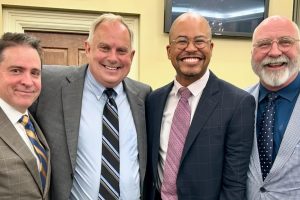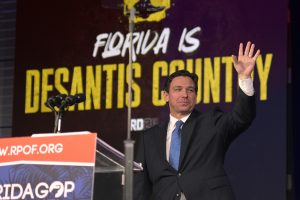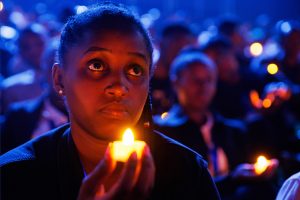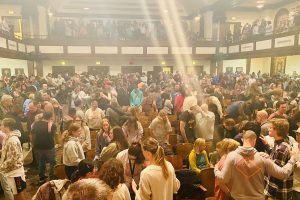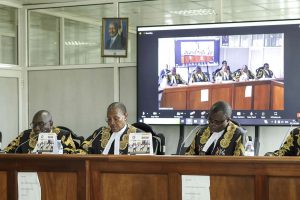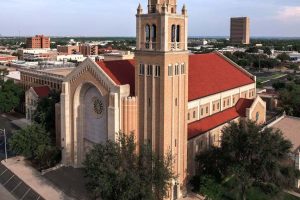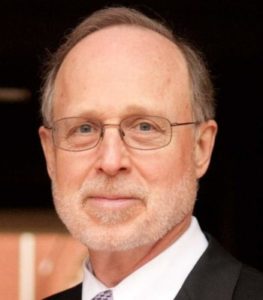 Could the civil war in the Southern Baptist Convention spark a massive realignment within the world’s largest non-Catholic denomination?
Could the civil war in the Southern Baptist Convention spark a massive realignment within the world’s largest non-Catholic denomination?
R. Albert Mohler Jr., the illustrious president of the Southern Baptist Theological Seminary, sparked an avalanche of liberal eye-rolling among liberal observers by announcing recently his conversion to the gospel according to Donald Trump. Well, Mohler didn’t go quite that far. He just said he would be voting Republican for the foreseeable future because Democrats aren’t pro-life. This is only news because, in the run-up to the 2016 election, Mohler came out as an ardent never-Trumper calling the president “the great evangelical embarrassment” and arguing that “continued public arguments that offer cover for Donald Trump are now not only implausible but excruciating.”
When a crafty tactician like Mohler reverses course like this, something big is afoot. The seminary president is the canary in the SBC coal mine, and he’s singing at the top of his lungs.
Mohler’s change of heart brings to mind a line often accredited to Alexandre Auguste Ledru-Rollin, a radical French politician during the failed revolution of 1848. “There go the people,” Ledru reportedly said as he sat in a Paris bistro, “I must follow them, for I am their leader.”
The quote is probably apocryphal, but it captures the sad truth about leadership. You can only lead where your people are willing to follow. Moderates lost control of the SBC because the people, most of them anyway, disagreed with them about the Bible.
Like the antagonist in Bob Dylan’s “Positively 4th Street,” Mohler wants “to be on the side that’s winning.” He senses that the pro-Trump faction in the SBC has won the day. The people, most of them anyway, have spoken and Dr. Mohler must follow.
Unfortunately, he can’t climb on board the Trump bus without kicking some good friends under it.
Outreach to black churches
The most prescient spirits within the “conservative resurgence” of the 1980s feared that their revolution might be seen by outside observers as a reactionary return to the pre-civil rights South. To counteract this impression, men like Mohler and his brilliant acolyte, Russell Moore, initiated an aggressive outreach to African American Baptist churches.
Mohler “is the canary in the SBC coal mine, and he’s singing at the top of his lungs.”
Mohler emerged as a champion of racial reconciliation, encouraging the denomination in 1995 to apologize for slavery, working to increase African American enrollment at Southern and, in late 2018, releasing a 72-page report detailing the complicity of the denomination and its oldest seminary in slavery, Jim Crow culture and resistance to the civil rights movement. True, the report ends during the civil rights era and has little to say about the challenges of the present moment. But admitting that men he once touted as theological exemplars grew powerful by presenting a biblical defense of slavery can’t have been easy. He endorsed the report because it was the right, and necessary, thing to do.
While the “moderates” who ran the SBC prior to 1980 were satisfied with cordial relations between white and black Baptists, the new regime set its sights on racial reconciliation. When Fred Luter, the African American pastor from New Orleans, was elected SBC president in 2012, it looked like a new day was dawning.
Dwight McKissic, pastor of the 3,000-member Cornerstone Baptist Church in Arlington, Texas, freely acknowledges his debt to the SBC. The denomination provided him with a heavily subsidized seminary education and supported his church-planting work in the Dallas metroplex until his congregation was up and running. Many African American pastors share his gratitude.
Moore left his position as provost and dean at Southern Seminary in 2013 to become president of the SBC’s Ethics and Religious Liberty Commission. Racial reconciliation has been at the heart of his message at the ERLC from the beginning. In books, blog posts and speaking engagements, he railed against religious and racial bigotry, chastised southern evangelicals for their culture-bound ways and even suggested that unrepentant Southern Baptist racists were heading straight for hell.
Threat of a backlash
But recent developments suggest that the SBC’s racial reconciliation initiative has never been popular with the grassroots. In fact, a vicious backlash is underway that threatens to drag the denomination back to the 1950s.
In 2018, Moore’s ERLC co-sponsored MLK50, a conference coinciding with the 50th anniversary of Martin Luther King Jr’s assassination. SBC President J.D. Greear admitted that the vast majority of SBC congregations are monochromatic, but rejoiced that “we’re much closer [to the kingdom ideal of full racial equality] than the mainline denominations, which are nearly all white.” Organizers anticipated a crowd of around 350 and were overwhelmed when 4,000 people, a quarter of them African American, showed up in Memphis.
Matt Chandler, pastor of the Village Church in Dallas, told the gathering he couldn’t sleep the night before his address because he knew his comments wouldn’t be well received by some. But “you have got to say something,” Chandler told attendees. “There is no way forward if white pulpits won’t talk.”
“The revolt against racial reconciliation efforts is rapidly metastasizing.”
MLK50 was still in full swing when a group of SBC church planters began complaining on social media about the influence of “Cultural Marxism” in the denomination and sharing angry screeds about King’s sexual immorality and theological liberalism. In response, representatives of the North American Mission Board demanded that the comments be removed because “our funding agreement demands that you be cooperating” and “your criticism of this SBC function is not cooperating.”
Later that year, McKissic submitted a resolution at the SBC’s annual gathering distancing the denomination from the “alt-right”, white supremacy and “Curse of Ham” theology. The committee tasked with handling resolutions initially refused to present the resolution, sparking several days of embarrassing headlines. Ultimately, a heavily edited version of the resolution (with McKissic’s reference to the Curse of Ham deleted) received overwhelming support from chastened messengers.
Realizing that the resolutions committee that dropped the ball in 2018 was almost exclusively white, Greear tried to avoid a repeat performance by nominating Curtis Woods to head the committee in 2019. A respected African American scholar, Woods was dividing his time between teaching at Southern Seminary and serving as associate executive director of the Kentucky Baptist Convention.
Resolutions committee tensions
Greear’s move revealed just how divided the SBC has become.
The committee received a resolution condemning Critical Race Theory (CRT), a form of social analysis proposed by African American legal scholar Derrick Bell. CRT assumes that American racism is invisible, systemic, ubiquitous and, especially for white Americans, unavoidable. In recent decades, CRT is typically combined with the idea of intersectionality, the idea that social oppression comes in multiple forms including sexism, ageism, homophobia, poverty and prejudice against the disabled. Positive social change, therefore, requires a redistribution of social power.
Most of the distinctly African American theology produced in the past 30 years, particularly the black theology of James Cone, is rooted in CRT and intersectionality.
The resolution presented to the committee rejected CRT as a form of godless Marxism and an unworthy substitute for the gospel of Jesus Christ. Under the leadership of chairman Woods, the committee amended the resolution to state that CRT, while useful as an analytical tool, must always be subservient to biblical revelation and a Christian worldview.
Woods sympathized with this position, but felt it lacked nuance. He had just completed a doctoral dissertation at SBTS which argued that the “Afrocentric” spirituality of scholars like Cone and W.E.B. Du Bois, although helpful in many respects, “ultimately abandons the authority of Scripture in its pursuit to maintain cultural identity.” Woods felt Christian scholarship could be “Afrosensitive” without being Afrocentric.
“The relationship between African American and white pastors in the SBC was improving dramatically until the election of Barack Obama.”
Florida pastor Tom Ascol, the outspoken head of Founders Ministries, proposed a “friendly” amendment reinstating the original form of the resolution. Chairman Woods characterized Ascol’s suggested wording as “unfriendly” because it eliminated the necessary balance between scholarship and orthodoxy the committee was going for. Since most messengers had no idea what Woods and Ascol were talking about, they voted overwhelmingly for the committee’s version.
Attacks on Cone and CRT
Ascol spent the next year filming interviews with Mohler, retired SBC scholar Tom Nettles and history professor and author Glenn Sunshine condemning CRT, intersectionality and the black theology of James Cone. The producers even found a white woman to condemn women pastors and a black woman to accuse Moore of racial division.
“By What Standard,” Ascol’s feature-length documentary, includes an extended clip of Cone calling white Christians to repentance. Speaking from the pulpit, Cone lays out the central thesis of his powerful book, The Cross and the Lynching Tree. The cross of Jesus Christ is “God taking the side of the victim” and “God making ultimate identification with the powerless.” Which means that “if the powerful in our society, the white people, if they want to become Christians, they have to give up that power and become identified with the powerless.”
Those unwilling to identify with the poor, Cone asserts, are not worthy to be called Christians. And how does one identify with the powerless? “You don’t just say, ‘please forgive me.’ The only way that your repentance can be authentic is that you give back what you took. And white people took a lot from black people.”
“By What Standard” features clips of McKissic endorsing women preachers, Moore saying that a denomination that doesn’t have room for Beth Moore (an evangelical speaker popular with Baptist women) “doesn’t have room for a lot of us,” and Greear suggesting that Jesus never condemned same sex attraction. The implied argument is that if you talk about social justice you are embracing CRT and intersectionality and will inevitably end up supporting women preachers and gay marriage while jettisoning a firm belief in inerrancy and the sufficiency of scripture.
Midway through the documentary, Nettles admits that the social justice prophets within the SBC believe in an inerrant Bible, affirm complementarian orthodoxy, and most are strict Calvinists. But, Nettles implies, if Moore and his progressive compatriots are repeating black theology talking points they have become far more radical than the “moderates” who once controlled the SBC.
Nettles isn’t the only Southern Baptist critic of “woke” theology. In 2018, California megachurch pastor John MacArthur, an influential voice among SBC conservatives, released The Statement on Social Justice & the Gospel, warning against “an onslaught of dangerous and false teachings that threaten the gospel, misrepresent Scripture, and lead people away from the grace of God in Jesus Christ.”
In February 2020 the Conservative Baptist Network was organized. According to promotional materials, the network “rejects various unbiblical ideologies currently affecting the Southern Baptist Convention such as Critical Race Theory, intersectionality, and social justice.”
In other words, the revolt against racial reconciliation efforts is rapidly metastasizing. By March of this year, Moore was facing a formal investigation by the SBC’s Executive Committee. This appears to be a last-ditch effort to placate disaffected churches that are threatening to withhold contributions to the denomination’s Cooperative Program.
”The SBC is changing in ways fraught with peril and promise.”
The SBC is at war with itself. The best way to know who is winning is to observe Mohler’s public statements. He knew that “By What Standard” was a hit-piece aimed at Russell Moore but lent his reputation to the project anyway. Now, as the investigation of his former protégé unfolds, Mohler bends the knee to president Trump.
Southern Baptists have been embarrassed by a sexual abuse scandal documented in an investigative series published by the Houston Chronicle. The newspaper’s reporting suggested a correlation between the species of “complementarian” patriarchy advocated by the SBC and clergy misconduct. When Greear launched an investigation of 10 prominent SBC churches (including Second Baptist in Houston), blowback was inevitable.
Presidential politics
The second precursor of the SBC’s internecine war is driven by presidential politics.
The relationship between African American and white pastors in the SBC was improving dramatically until the election of Barack Obama. Many African American pastors (even those who tend to vote Republican) were overjoyed to see one of their own in the White House. The majority of white SBC pastors, to put it politely, didn’t share this enthusiasm. When Donald Trump ascended to the throne, prominent white SBC pastors eagerly signed up for the president’s Evangelical Advisory Board while their black colleagues looked on in horror.
Although Moore has largely refrained from political comment in recent years, his opponents haven’t forgotten that he dismissed Trump as “an arrogant huckster” during the 2016 campaign and has never apologized for that characterization. It is difficult to avoid the conclusion that Mohler endorsed Trump as a way of distancing himself from Moore and the ERLC.
Moore will likely survive the current investigation (the second of his tenure). He’s an eloquent public intellectual who enjoys considerable support in the SBC and has added considerable luster to the denominational brand.
But how long can Moore perform his duties as the target of a steadily intensifying hate campaign? And if he steps down, what then? It is difficult to see him taking another post with one of the SBC entities or returning to his former role as a seminary administrator; he would be a marked man. At the same time, his commitment to biblical inerrancy and Calvinism make him a poor fit for the Protestant Mainline. Since he continues to be in high demand as an author and public speaker, he could easily leverage that popularity to organize a parachurch ministry free from SBC censorship.
If Moore does step down, expect to see a mass exodus of African American congregations from the SBC. Moore is the only glue holding many pastors in the denomination. An SBC that doesn’t have room for Russell Moore, many will conclude, doesn’t have room for us either. Since most of these churches are dually affiliated with predominantly African American Baptist denominations like the National Baptist Convention, cutting ties with the SBC will be relatively painless.
An exodus of African American churches would, obviously, leave the SBC’s commitment to racial reconciliation in rags and tatters. How would the white pastors who have partnered with Moore in recent years respond to an SBC awash in racial resentment and reactionary politics? Would they stay? Some would; many probably wouldn’t. Because these pastors, and the congregations they lead, are relatively young, their departure could create new configurations that don’t fit the traditional liberal-conservative binary.
All of this could transform the public face of American evangelicalism, sparking new alliances and a blessed retreat from culture war religion. Whatever happens, the SBC is changing in ways fraught with peril and possibility.
Related opinion:
Marv Knox | The moral hypocrisy of Albert Mohler (and evangelicals of his ilk)











